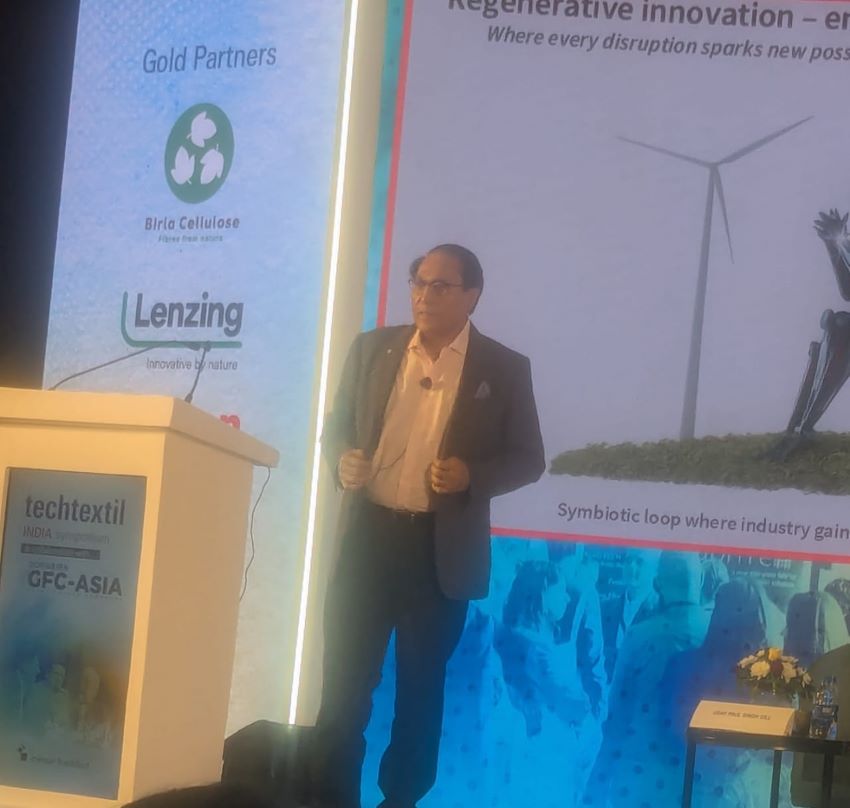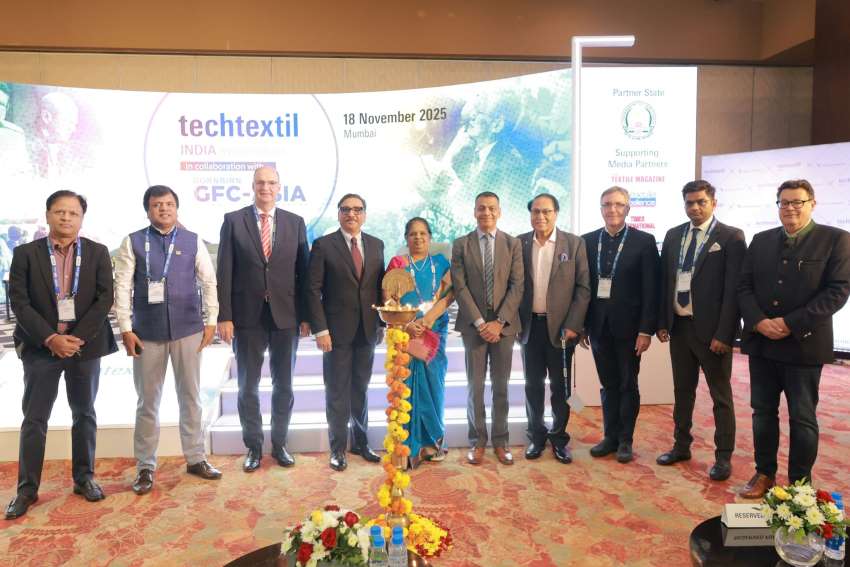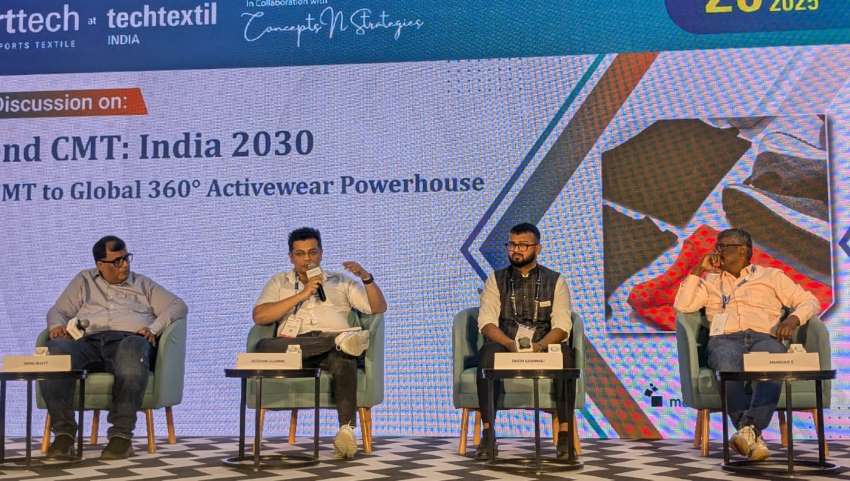FW
Marked by a decline in key international benchmarks, global cotton prices eased during October. According to Cotton Incorporated, the softer trend reflects persistent weak global demand and typical seasonal market softness as the 2025 crop harvest season advances.
The NY/ICE December contract dropped below a key support level of 66 cents per pound, hitting a new contract-life low below 65 cents, though it managed a slight recovery later in the month. The Cotlook A Index slipped from 78 cents to 76 cents per pound.
In China, the CC Index (3128B) fell to 94 cents per pound. The Chinese Yuan (RMB) remained stable against the dollar at roughly RMB 7.12 per US$.
Prices in South Asian markets were comparatively stable, largely due to domestic currency strength. India's Shankar-6 cotton prices held steady at 78 cents per pound (around Rs 55,000 per candy), supported by a stable Rupee Rs 88 per US$.
Pakistan saw spot prices remain steady at about 68 cents per pound backed by a stable Pakistani Rupee at PKR 28 per US$.
The overall weakness across global benchmarks suggests that worldwide demand for cotton is sluggish, a factor that continues to weigh on the market as new supply enters the system.

The inaugural 'Italian Fashion Days in India' (Le Giornate della Moda Italiana nel Mondo) officially kicked off yesterday, October 28, at the Italian Embassy in New Delhi, marking a significant new step in the strategic partnership between Italy and India. This three-city initiative, described as the first of its kind in India, was a key component of Italy's "Diplomacy and Growth Strategy" that continued in Mumbai on Oct 29 and on Oct 30th in Ahmedabad.
On Day 2 of the summit, the spotlight shifted from international trade to internal corporate dynamics, revealing a major cultural shift that is driving the successful turnaround of major Italian fashion and lifestyle houses.
The Turnaround Strategy: Investment and culture
Speaking at the event, Alberto Racca, CEO of the Miroglio Group, Trussardi, and Gentle Society, discussed the difficult period his company faced six years ago, noting that things were “not going so well” even before the COVID-19 pandemic. However, the crisis period led to aggressive strategic choices, resulting in a dramatic turnaround, with business now doing "much better."
Racca attributed this success not just to financial decisions, but to a fundamental change in corporate philosophy. Strategic investments in product development, customer relationship management (CRM), and brand positioning were crucial, but the "key factor of life for all of this is a way of doing things."
Age is Just a Number: The talent obsession
The most radical change involves a shift away from traditional, seniority-based management towards an intense focus on young, high-potential talent. Racca’s new strategy explicitly aims to "train those who learn quickly and make things happen, regardless of their age."
This is not just rhetoric; it’s a measurable reality. Racca disclosed that the company now has $100 million businesses driven by people as young as 29 years old. He insisted that age differences are irrelevant, as the obsession is purely on talent.
The company has a highly selective program targeting university graduates, putting 24-year-olds through an 18-month high-intensity course with specific project responsibilities. The goal is clear: promote these individuals into middle management within two years.
“It has paid,” Racca noted, explaining that this rapid acceleration attracts a quality of management that might otherwise be drawn to different industries.
The power of ‘Gentleness’
Underpinning this talent revolution is a new cultural cornerstone: gentleness. In a world that often seems to demand “brute force,” Racca proposed a different path.
"We are going to talk about gentleness, because gentleness doesn't mean being naive, but it means being intelligent in terms of taking the value from the person around us," he explained. The philosophy emphasizes a culture of continuous learning—rejecting the idea of being the one who “knows everything” in favor of the one who “learns everything.”
"Gentle Society" refers to the brand philosophy by Trussardi, which promotes kindness and meaning in everyday life. The Trussardi concept is showcased in its FW25 campaign and is an open collective of creatives.
By focusing on humility, rapid growth, and recognizing the intelligence and value of every collaborator, this Italian fashion executive is demonstrating that a supportive, talent-obsessed culture can be the most powerful driver for enduring global success in the modern, impatient marketplace.

The global garment industry, long a symbol of globalization’s success and excess is entering an age of disruption. Traditional business models are being upended by changing consumer behavior, supply chain shocks, and technological transformation. Yet according to renowned apparel strategist David Birnbaum, much of the current turbulence stems not from the industry itself, but from the misguided assumptions of governments and retailers who misunderstand its unique dynamics. “The problem,” Birnbaum argues, “is that policy and business decisions are designed for industries that look nothing like ours.” His critique, though directed primarily at Western policymakers, resonates across the global fashion economy from Dhaka to Los Angeles.
Government policies miss the mark
Birnbaum’s central argument targets the mismatch between government trade policies and the economic realities of garment production. Take, for instance, the Trump-era tariffs imposed on Chinese and Vietnamese apparel. The goals: bringing back US manufacturing jobs, boosting government income, and achieving trade reciprocity sound reasonable in theory. But in practice, they miss the mark.
Garment manufacturing, Birnbaum points out, is not coming back to the US anytime soon. The economics simply don’t work: labor costs are too high, automation too complex, and supply chains too globalized. Moreover, while tariffs punish exporters like China and Vietnam, they simultaneously hurt some of the world’s poorest garment-producing nations viz. Bangladesh, Pakistan, and Cambodia by making their products less competitive.
The same logic flaw plays out in India’s policy ecosystem. Government schemes like PLI (Production-Linked Incentives) and RoSCTL (Rebate of State and Central Taxes and Levies) aim to boost manufacturing competitiveness. Yet, experts argue they often fail to recognize that garmenting is a low-margin, high-volume, labor-sensitive industry, not easily scalable through subsidies alone. “Apparel is not about capital intensity or technology alone; it’s about predictability, agility, and trust across borders,” says Rajiv Kapoor, former head of an export consortium in Tiruppur. “When policies chase quick wins, they miss the fabric of the business.”
Ironically, these tariffs may even reduce government income, as importers shift sourcing to low-duty or least-developed countries, shrinking the taxable base. The result is a lose-lose equation: no jobs repatriated, no fiscal gain, and higher prices for consumers.
Why garments don’t make money for retail giants
Birnbaum’s second, more provocative claim is that garments are a fundamentally unprofitable category for large retailers. Unlike electronics or household goods, apparel presents unique challenges:
Infinite variability: A single shirt can exist in hundreds of combinations fabric, color, gender, size, and fit. A microwave, by contrast, has ten at most.
Short shelf life: Fashion’s rapid turnover means a product has roughly eight weeks to sell before markdowns begin.
Brutal competition: Off-price chains, secondhand markets, and peer-to-peer resale platforms saturate the market.
Retail giants like Walmart and Target have quietly scaled back apparel offerings for this reason, retaining only evergreen lines like Wrangler jeans. The underlying economics are brutal: too many SKUs, too much waste, and too little margin.
In India, a similar pattern is emerging. Reliance Retail and Aditya Birla Fashion & Retail (ABFRL) are focusing more on consolidation and private labels, steering away from over-diversified apparel portfolios. “The days of treating fashion as a margin driver are gone,” says an executive at ABFRL. “Now, it’s a traffic driver — a way to bring customers into the ecosystem.”
All about Power, Profit, and Pressure
Other analysts support Birnbaum’s diagnosis but shift the focus from product complexity to power dynamics. In the global apparel value chain, brands and buyers mostly headquartered in wealthy nations capture the lion’s share of profit. Manufacturers, often in developing economies, operate on razor-thin margins and absorb the risks. A cancelled order or a late shipment can destroy an entire season’s profit.
India, despite being the world’s fifth-largest apparel exporter, faces the same squeeze. Exporters from clusters like Tirupur, Ludhiana, and Noida often absorb currency fluctuations, delayed payments, and compliance costs while global buyers demand faster lead times and lower prices. This imbalance has spurred a quiet but visible shift: Indian manufacturers are moving up the value chain, investing in design, branding, and direct-to-consumer (D2C) channels. Companies like Arvind Ltd, Shahi Exports, and Gokaldas Exports are experimenting with vertically integrated models, where they own not just the factory but also the design and retail interfaces.
This power imbalance explains why many factories struggle to meet social and environmental compliance goals. As long as buyers refuse to pay prices that reflect true production costs, improvements remain financially untenable.
Can automation rewrite the rules?
Birnbaum’s skepticism toward reshoring may be valid for today but emerging technology is changing the equation. The rise of smart factories and digitally integrated production offers the potential for nearshoring or even reshoring certain categories. These vertically integrated systems leveraging 3D knitting, AI-driven pattern design, and robotics could drastically reduce lead times and enable micro-production closer to consumer markets.
Companies like Shima Seiki (Japan) and SoftWear Automation (US) are pioneering systems capable of sewing simple garments autonomously. For high-fashion or fast-turnover apparel, this could be revolutionary.
India’s new textile hubs in UP and Bihar, supported by the PM MITRA Parks scheme, are designed with this vision: end-to-end, digitally integrated clusters capable of fast, flexible, and sustainable production. As Pooja Mehta, a sourcing analyst at Technopak, explains: “If India can combine its labor advantage with digital precision, it could become the next great global manufacturing hub — not just for cost, but for capability.”
Profits through precision, Mexico and beyond
The notion that apparel can never be profitable is being challenged by data-driven success stories. A Mexican fashion retailer implemented advanced inventory and forecasting tools, improving product availability and cutting excess stock. The result: a 57 per cent revenue increase. Similarly, brands investing in demand forecasting, localized production, and hybrid retail models (combining physical and online sales) are outperforming peers. These examples illustrate that profitability is possible not by abandoning apparel, but by reinventing how it’s managed.
In India, digital-native brands like Snitch, Bewakoof, and Rare Rabbit are proving that with fast supply chains, limited-edition drops, and analytics-led inventory control, margins can improve dramatically.
Sustainability as strategy
The DBL Group in Bangladesh exemplifies this evolution. Once a conventional manufacturer, it has transformed into a sustainability-driven enterprise. Through water recycling systems, energy-efficient dyeing, and partnerships with global brands, DBL has proven that compliance and profitability can coexist.
Indian firms are following suit. Raymond, Welspun, and Eastman Exports are investing in zero-liquid discharge facilities and circular design systems. Shahi Exports has developed partnerships with global fashion houses to pilot regenerative cotton farming, directly linking farm to factory. This sustainability-led differentiation is fast becoming the only way to stay relevant in a market where Western buyers are under ESG (environmental, social, and governance) scrutiny.
According to the International Trade Centre, such initiatives have improved margins, enhanced brand reputation, and attracted premium clients. This model could redefine what success looks like for the next generation of apparel suppliers.
US apparel import data further illustrates the sector’s volatility. Studies show, garment imports by value rose over 40 per cent in the first half of 2022 only to fall sharply later that year amid inflation and demand contraction. The whiplash reflects how macro factors like energy prices, consumer sentiment, logistics costs directly shape fashion flows.
Meanwhile, longer-term trends show declining per-capita apparel consumption in developed markets, even as emerging economies’ middle classes grow. Brands and policymakers must navigate this dual-speed world, where supply chains are both globalized and fragmented.
Rethinking the industry’s future
The garment industry’s transformation is not a simple story of decline or resurgence, it’s a story of realignment.
Governments must abandon one-size-fits-all trade policies that treat T-shirts like TVs. Retailers must rethink apparel not as a disposable product, but as a data-driven service that blends production, sustainability, and circularity. And suppliers must invest in technology, transparency, and agility to survive the next wave of disruption.
Birnbaum’s warning stands as both critique and challenge: until policymakers and business leaders truly understand how garments are made, priced, and sold, they will continue to mismanage one of the world’s most vital and misunderstood industries.
The Yamuna Expressway Industrial Development Authority (YEIDA) has initiated the process to acquire the remaining 94 acre for its ambitious Apparel Park project in Sector 29, Noida. The 175-acre project is being developed at various sites.
The new land acquisition will significantly strengthen the region’s apparel manufacturing ecosystem, thereby boosting local industrial activity and employment. YEIDA officials state, the additional land will resolve existing land constraints and enable the development of common infrastructure essential for large-scale textile operations.
According to RK Singh, CEO, this expansion will expand the region’s apparel ecosystem, helping entrepreneurs improve export efficiency and capabilities.
Strategically located near the upcoming Noida International Airport, the projected is expected to generate over 300,000 jobs, with approximately 70 per cent reserved for women. The park is designed to integrate the entire apparel value chain - from production and packaging to export - within a single ecosystem. This comprehensive setup will enable faster turnaround times and lower operational costs for exporters
To create a self-reliant and globally competitive environment, YEIDA plans to install extensive supporting infrastructure, including a 45-m-wide road connecting the park's different zones, showrooms, raw material sourcing centers, testing laboratories, design studios, skill development centers, and dyeing and printing units.
Nike and fashion designer Martine Rose have launched a new collaborative apparel collection inspired by the world of gaming. Launching globally on October 30, the collection reimagines esports as a realm of athleticism, self-expression, and style.
Eight years into their creative partnership, Martine Rose and Nike have consistently blurred the lines between sport, culture, and identity. This latest chapter specifically celebrates the inclusivity and individuality of gaming communities.
The collection features relaxed, functional silhouettes, including apparels like football kits, ski jackets, hoodies and track pants. The oversized hoodie and joggers recall Martine Rose’s Spring/Summer 2015 collection, while a vibrant red colorway nods to early-2000s grime culture.
Further, the collection includes a reinterpreted football kit featuring a new Nike x Martine Rose crest, and a ski parka that references retro ‘nerdwear.’ It also offers a reissued cross-body bag adapted from Nike’s archives, a subtle wink to UK street style.
The collection also introduces two new colorways of the Shox MR4 - the unique hybrid dress shoe and sneaker that first debuted in 2022. Distinguished by its squared-off toe and heeled Shox columns, the silhouette will now be available in white and silver.
The launch is supported by a campaign that features elite gamers, including ANa, Billy Mitchell, Scarlett, SonicFox, and TenZ.
One of Italy’s premier textile and fashion companies, OVS has officially partnered with Cotton made in Africa (CmiA) to ensure verifiable transparency and traceability for the company, from the initial cotton bale to the final product.
So far in 2025, the Italian fashion house has already brought nearly 2.5 million items made of CmiA-verified cotton to market, including a line of children’s apparel. OVS products containing CmiA cotton are marked with the ‘Cotton made in Africa Inside’ label. This designation signifies that the cotton is physically traceable throughout the entire value chain.
To qualify for this label, products must be proven to contain only CmiA-verified cotton. In 2025 alone, OVS has produced almost 2.5 million textile items under the CmiA Inside label, primarily consisting of denim products like jeans and denim jackets.
Tina Stridde, the Managing Director, Aid by Trade Foundation, avers, OVS’s implementation of Cotton made in Africa Inside makes a strong statement about transparency and traceability.
In addition to criteria for the protection of water, soil, and biodiversity, the CmiA sustainability standard also enforces strict social criteria and indicators for gender equality, human rights and community support.
An internationally recognized standard for sustainably produced cotton and the largest such standard in Africa, Cotton made in Africa (CmiA) guarantees transparent traceability and is 100 per cent GMO-free. Over 30 per cent of African cotton is CmiA or CmiA Organic verified. By using this cotton, over 60 textile companies and fashion brands support approximately 800,000 small-scale farmers in practicing ecologically and economically resilient agriculture, improving their families' living standards, and protecting the environment.
The International Textile Manufacturers Federation (ITMF) and the International Apparel Federation (IAF) successfully concluded their second joint convention, held this year in Yogyakarta, Indonesia. Working closely with the host, the Indonesian Textile Association (API), the event attracted over 400 delegates from around the globe, representing the entire textile and apparel value chain.
Highly praised, the conference program featured a diverse range of high-level discussions on issues shaping the global industry's future. It focused on key topics including Technology adoption and AI applications; Evolving legislation and the reduction of audit fatigue; Decarbonization and fiber innovation, transformation of the Indonesian textile and apparel sector.
The event also celebrated excellence, showcasing innovation, sustainability, and collaboration through presentations by the winners of the ITMF Award.
Beyond the sessions, ITMF and IAF upheld their tradition of hosting unique and culturally rich social events. Delegates were welcomed by the Sultan of Yogyakarta at a distinguished opening dinner. The Gala Dinner provided a spectacular setting for networking and celebration, held against the backdrop of the iconic Prambanan Temple.
This special evening also marked the beginning of the tenures for new leadership: Juan Parés as the new President, ITMF and Stefano Festa Marzotto, President, IAF.
The convention program provided delegates with valuable firsthand insights into Indonesia's dynamic ecosystem through company visits. Attendees toured prominent facilities, including PT Dan Liris, PT Pan Brothers, and PT Ungaran Sari Garment, witnessing the country’s commitment to manufacturing excellence, innovation capacity, and sustainability.
The success of the 2025 convention was strongly supported by the Indonesian Textile Association (API), PT Dan Liris, and PT Pan Brothers. Collectively, they projected a positive and ambitious image of Indonesia as a premier, forward-looking location for both textile and garment production.
During its Annual Conference & IAF World Fashion Convention 2025, held on October 24, 2025 in Yogyakarta, Indonesia, ITMF elected new Board Members.
The Federation elected Juan Parès(Spain) as the new President. ITMF while Yan Yan from China elected as the new Vice President. Meanwhile Mustafa Denizer was re-elected as the Vice President while Ernesto Maurer was re-elected as Honarary Secretary.
Addtionally, the Board also re-elected the executive Board Members including Salman Ispahani (Bangladesh), Yingxin Xu (China), Suchita Jain Oswal (India), Tae Jin Kang (Korea), Anees Khawaja (Pakistan), Stefan Hutter (Singapore) and Uday Gill.
Rafael Cervone (Brazil), Mohammad Kassem (Egypt), Michelle Tjokrosaputro (Indonesia), Loek de Vries (Netherlands), and Muharrem Kayhan (Türkiye)were co-opted to the Board.
KV Srinivasan (India) was appointed Honorary Life Member of the Federation in recognition of his outstanding contribution to the Federation as Vice President (2018-2023) and as President (2023-2025).
Global supply chain solutions company offering customized solutions to global brands and retailers across services like product development, sourcing, manufacturing, and brand management, PDS Ltd registered a 14 per cent rise in revenue from operations to Rs 3,419 crore while their consolidated revenue for FY26 increased to Rs 12,578 crore.
By October 2025, the company’s order book increased by 15 per cent Y-o-Y to Rs 5,308 crore, thus indicating steady business momentum amid global macroeconomic headwinds. Their net working capital days improved from 17 days (March 2025) to 6 days (September 2025), driving cash flow from operations of Rs 593 crore.
According to Pallak Seth, Executive Vice Chairman , the results demonstrate, sustainable growth is achieved through focus, efficiency, and disciplined execution. The company’s growth journey is centered on strengthening and expanding the potential of their existing businesses and partnerships, with no new investments at this stage. By sharpening their focus on execution, leveraging synergies, and fostering collaboration across their global network, the company is building a stronger, more efficient, and purpose-driven entity — one that grows sustainably and responsibly while upholding the highest standards of governance.
Sanjay Jain, Group CEO, adds, the company’s focus on driving operational excellence across their core business verticals can be seen in their results, with optimized working capital and reduced net debt levels. By focusing on high-impact areas and streamlining underperforming verticals, the company fosters responsible growth and a future-ready organization scaling towards enhancing profitability.
A global fashion infrastructure platform, PDS offers product development, sourcing, manufacturing, and distribution for major brands and retailers worldwide handling over $2.2 billion of Gross Merchandise Value. The Company operates a vast global network covering over 90 offices in 22 countries, with over 4,500 employees and 6,000 factory associates worldwide.
PDS also offers a bespoke end-to-end outsourcing solution, engaging dedicated talent and infrastructure as an extended arm of retailers and brands.
Eastman Naia has secured its fourth consecutive ‘Dark Green Shirt’ rating in Canopy’s Hot Button Report at the 2025 Textile Exchange Conference in Lisbon, further advancing its ambitious sustainability targets for the 2025–2030 period.
The Dark Green Shirt is Canopy’s highest recognition, annually ranking man-made cellulosic fiber producers on key factors like forest conservation, responsible sourcing practices, and supply chain transparency. This repeated honor confirms Naia’s continued leadership in environmental stewardship, establishing it as one of the most trusted and transparent fiber platforms in the industry.
The award announcement was timed with the release of Naia’s 2025 Sustainability Progress Report and the unveiling of its updated 2030 sustainability goals. These new targets focus on critical areas, including climate mitigation, circularity at scale and social impact.
These milestones collectively emphasize Naia’s long-term commitment to delivering measurable, transparent progress across the entire value chain and working to reshape the materials economy for the better.
At the conference, Naia also showcased few more versatile fibers including the Naia On the Move featuring the high-performing Naia Renew staple fiber, Naia Denim which blends comfort and circularity for authentic, fashionable denim applications and the new Naia GlowNow fiber to promoteits signature filament yarn for women’s low-impact fashion.
All Naia fibers are sourced from sustainably managed forests. Furthermore, products made with Naia Renew contain 40 per cent GRS-certified recycled content achieved through Eastman’s advanced molecular recycling technology.
Founded in 1920, Eastman is a global specialty materials company dedicated to enhancing the quality of life in a material way. Headquartered in Kingsport, Tennessee, US, the company works with customers to deliver innovative products while upholding a strong commitment to safety and sustainability. The company employs approximately 14,000 people worldwide, serves customers in over 100 countries, and generated revenue of approximately $9.4 billion in 2024.












